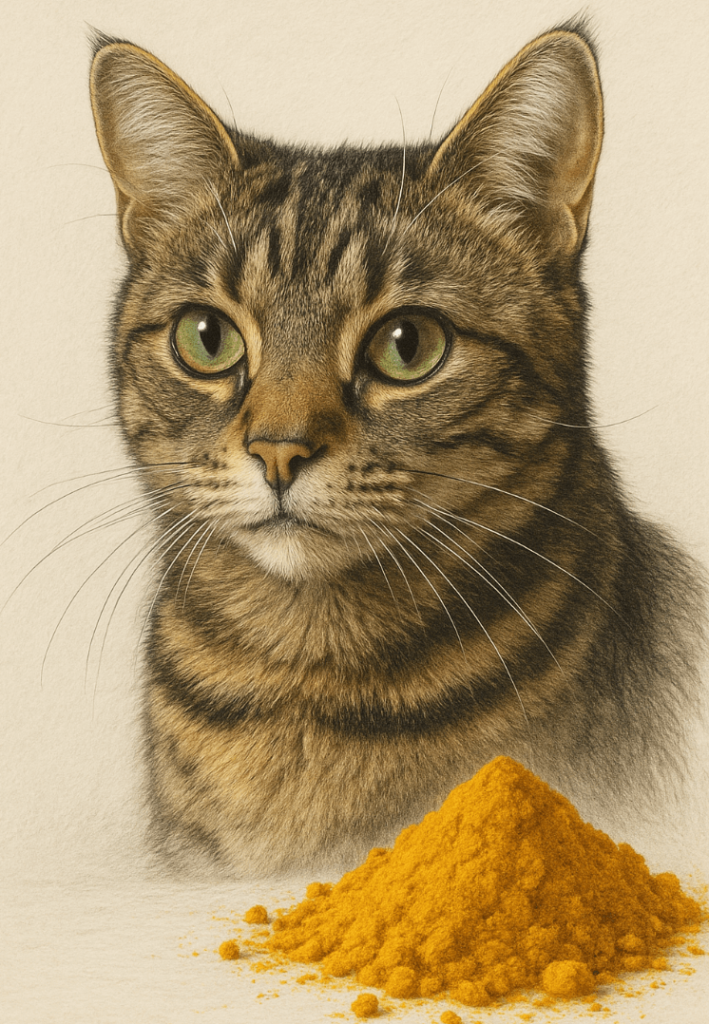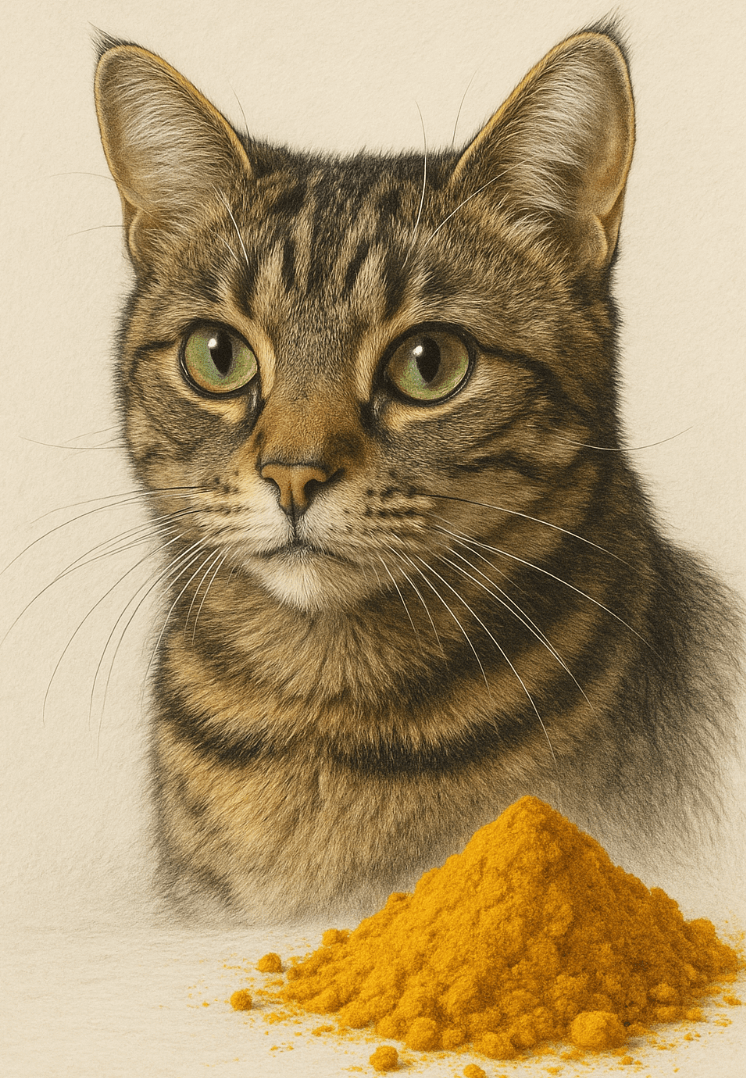Can Cats Eat Turmeric? Exploring the Benefits and Risks
Turmeric, a vibrant yellow spice known for its anti-inflammatory properties, has gained popularity in human health and wellness. But can this golden wonder be shared with our feline friends? As cat owners become more conscious of their pets’ diets, questions about introducing natural supplements like turmeric arise. While turmeric offers potential health benefits, it’s essential to approach feeding it to cats with caution. This blog post dives into the science behind turmeric, its effects on feline health, and how to safely incorporate it into your cat’s diet—if at all. Let’s explore whether turmeric is a safe and beneficial addition to your cat’s meals.
Potential Health Benefits of Turmeric for Cats
Turmeric contains curcumin, a compound celebrated for its anti-inflammatory and antioxidant properties. When used appropriately, turmeric may offer some health benefits for cats. However, moderation and veterinary guidance are key.
Anti-Inflammatory Effects:
Curcumin can help reduce inflammation, which may benefit cats suffering from conditions like arthritis or joint pain.Antioxidant Properties:
The antioxidants in turmeric combat free radicals, potentially supporting overall immune function and longevity.Digestive Support:
In small amounts, turmeric may aid digestion by soothing the stomach lining and promoting gut health.Immune System Boost:
Its immune-enhancing properties could help cats recover faster from illnesses or infections when used as part of a balanced diet.Joint Health Improvement:
For senior cats or those with mobility issues, turmeric might provide relief from stiffness and discomfort associated with aging.
While these benefits sound promising, it’s crucial to remember that cats metabolize foods differently than humans, so professional advice is always recommended before introducing turmeric.
Risks and Precautions of Feeding Turmeric to Cats
Despite its potential benefits, turmeric isn’t without risks, especially for sensitive or allergic cats. Understanding these dangers ensures you make an informed decision about including turmeric in your cat’s diet.
Gastrointestinal Upset:
Too much turmeric can irritate your cat’s stomach, leading to vomiting or diarrhea.Liver Sensitivity:
High doses of turmeric may strain the liver, particularly in cats with pre-existing liver conditions.Medication Interactions:
Turmeric can interfere with certain medications, such as blood thinners, making it unsafe for cats on prescription treatments.Allergic Reactions:
Some cats may develop skin rashes, itching, or other signs of allergies after consuming turmeric.Difficulty Absorbing Curcumin:
Cats’ bodies struggle to absorb curcumin efficiently, meaning the benefits may not outweigh the risks in most cases.
These factors highlight why turmeric should only be introduced under veterinary supervision and in carefully controlled amounts.
Check this guide 👉Can Cats Eat Lavender? Best 7 Expert Tips!
Check this guide 👉Can Cats Eat Cheesecake? Best 7 Expert Tips!
Check this guide 👉Can Cats Eat Dog Treats? Best 7 Expert Tips!

Benefits of Turmeric for Cats | Risks of Feeding Turmeric to Cats |
|---|---|
Reduces inflammation | Can cause gastrointestinal upset |
Supports joint health | May interact with medications |
Rich in antioxidants | Potential liver strain |
Aids digestion in small amounts | Difficult for cats to absorb curcumin |
Boosts immune system | Risk of allergic reactions |
How to Safely Introduce Turmeric to Your Cat’s Diet
If you decide to try turmeric for your cat, doing so safely is paramount. Follow these guidelines to minimize risks and maximize potential benefits.
Consult Your Veterinarian First:
Always seek professional advice before adding any new supplement to your cat’s diet.Start with Tiny Amounts:
Begin with a pinch of turmeric—less than 1/8 teaspoon—to monitor your cat’s reaction.Mix It with Food:
Blend turmeric powder with wet food or mix it into homemade treats to mask the taste.Enhance Absorption with Healthy Fats:
Pair turmeric with a small amount of coconut oil or fish oil to improve curcumin absorption.Monitor for Adverse Reactions:
Watch for signs of digestive distress, lethargy, or changes in behavior, and stop immediately if problems arise.
By following these steps, you can introduce turmeric cautiously and responsibly, prioritizing your cat’s well-being above all else.
Signs Your Cat May Benefit from Turmeric (Under Supervision)
Certain health conditions might make turmeric worth considering for your cat—but only under strict veterinary guidance. Here are some scenarios where turmeric could potentially help.
Arthritis or Joint Pain:
If your cat struggles with mobility due to joint issues, turmeric’s anti-inflammatory properties might provide relief.Chronic Inflammation:
Conditions like inflammatory bowel disease (IBD) may benefit from turmeric’s soothing effects on inflamed tissues.Weakened Immune System:
Elderly or immunocompromised cats might see improved resilience with antioxidant-rich supplements like turmeric.Post-Surgical Recovery:
After surgery, turmeric could support healing and reduce swelling, though clearance from your vet is critical.Skin Irritations or Allergies:
In rare cases, turmeric’s anti-inflammatory effects may alleviate symptoms of certain skin conditions.
Always discuss these possibilities with your veterinarian to determine if turmeric is appropriate for your cat’s specific needs.
Common Mistakes to Avoid When Feeding Turmeric to Cats
Feeding turmeric to your cat requires careful consideration to avoid mistakes that could harm their health. Here are some pitfalls to watch out for.
Overdosing:
Giving too much turmeric can overwhelm your cat’s system, leading to adverse effects rather than benefits.Ignoring Underlying Conditions:
Administering turmeric without knowing your cat’s full medical history can exacerbate existing health problems.Skipping Veterinary Approval:
Assuming turmeric is safe without consulting a professional can put your cat at risk of complications.Using Low-Quality Products:
Cheap turmeric powders may contain additives or contaminants harmful to cats; opt for pure, high-quality options.Forcing Consumption:
If your cat refuses to eat food containing turmeric, forcing them can create stress and aversion to mealtime.
Avoiding these mistakes ensures a safer experience if you choose to experiment with turmeric.
Alternatives to Turmeric for Supporting Feline Health
If turmeric isn’t suitable for your cat, there are other natural options to promote their well-being. These alternatives cater to various health needs while minimizing risks.
Omega-3 Fatty Acids:
Found in fish oil, omega-3s support joint health and reduce inflammation effectively.Probiotics:
Probiotic supplements or fermented foods can improve gut health and digestion naturally.Glucosamine and Chondroitin:
Commonly used for joint support, these supplements are safer for long-term use in cats.Pumpkin Puree:
Rich in fiber, pumpkin aids digestion and helps regulate bowel movements in cats.Herbal Remedies:
Calming herbs like chamomile or valerian root can address anxiety or stress-related issues.
These alternatives provide effective ways to support your cat’s health without resorting to turmeric.
Understanding Your Cat’s Unique Dietary Needs
Every cat is different, and understanding their individual dietary requirements is crucial before introducing any new ingredient.
Species-Specific Metabolism:
Cats are obligate carnivores, meaning their bodies are designed to process animal proteins—not plant-based compounds like turmeric.Age and Activity Level:
Kittens, seniors, and highly active cats have varying nutritional needs that must be met through tailored diets.Existing Health Conditions:
Cats with chronic illnesses require specially formulated diets to manage their symptoms effectively.Food Preferences:
Cats can be picky eaters, so even healthy additions like turmeric might go uneaten if they dislike the taste.Hydration Needs:
Wet food or added water sources are vital for maintaining hydration, regardless of dietary supplements.
By recognizing these factors, you can tailor your approach to ensure your cat receives the nutrition they need to thrive.
Frequently Asked Questions About Cats and Turmeric
Is turmeric safe for kittens?
No, kittens have sensitive systems and should not consume turmeric unless explicitly advised by a vet.
Can I use fresh turmeric instead of powdered?
Fresh turmeric is harder to measure accurately and may not mix well with cat food; stick to small amounts of powdered turmeric.
How often can I give my cat turmeric?
Limit turmeric to once or twice a week at most, and never exceed the recommended dosage.
Does turmeric replace medication for arthritis?
No, turmeric is not a substitute for prescribed medications; it should complement treatment only under veterinary supervision.
What if my cat doesn’t like the taste of turmeric?
Most cats dislike the strong flavor, so mixing it with tasty food or using alternative treatments may be necessary.
Making Informed Choices for Your Cat’s Health
While turmeric holds potential as a natural remedy for certain feline ailments, it’s not a one-size-fits-all solution. Cats have unique dietary needs, and what works for one may not suit another. Before introducing turmeric—or any supplement—into your cat’s diet, always consult your veterinarian to ensure safety and efficacy. By staying informed and cautious, you can prioritize your cat’s health while exploring ways to enhance their quality of life naturally. Remember, your furry friend relies on you to make the best decisions for their well-being.
Do Cats Have Taste Buds? Best 7 Expert Tips! – Discover how cats experience flavors and why their taste is so unique.
Do Dogs Have Taste Buds? Best 7 Expert Tips! – Discover how dogs experience taste, their preferences, and what it means for their diet and health.
Can Cats Taste Sweet? Best 7 Expert Tips! – Discover why cats can’t taste sweetness, how it affects their diet, and tips to keep them healthy and happy.
Can Dogs Taste Sweet? Best 7 Expert Tips! – Discover how dogs perceive sweetness, which foods are safe, and tips to manage their sweet cravings responsibly.





